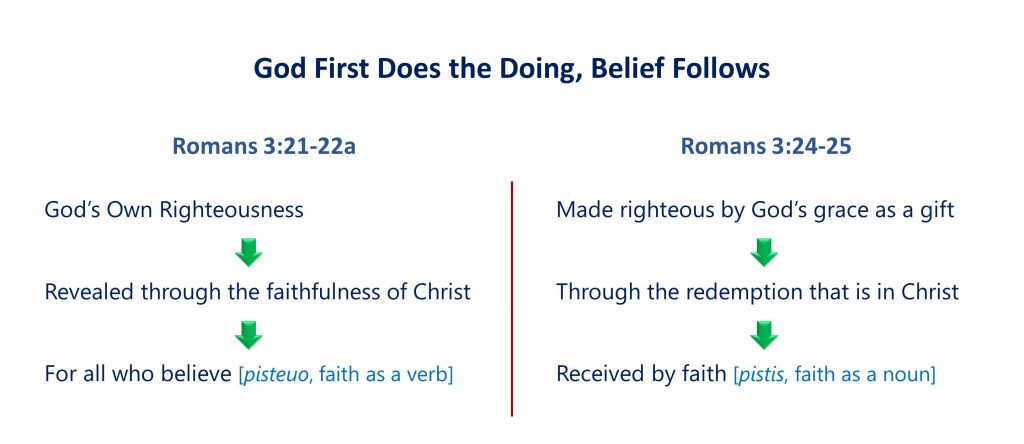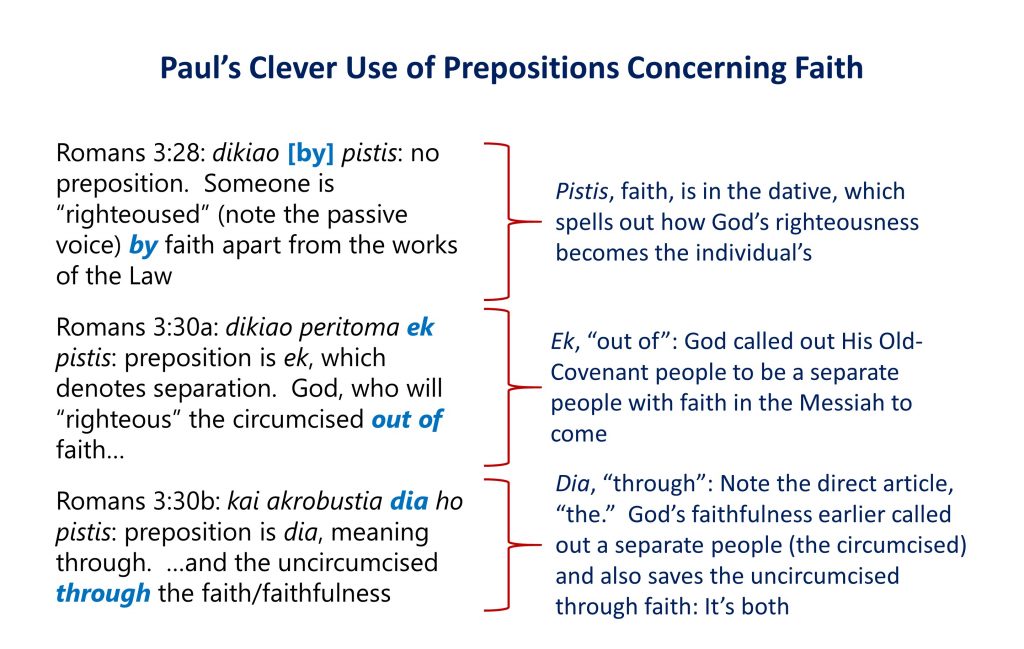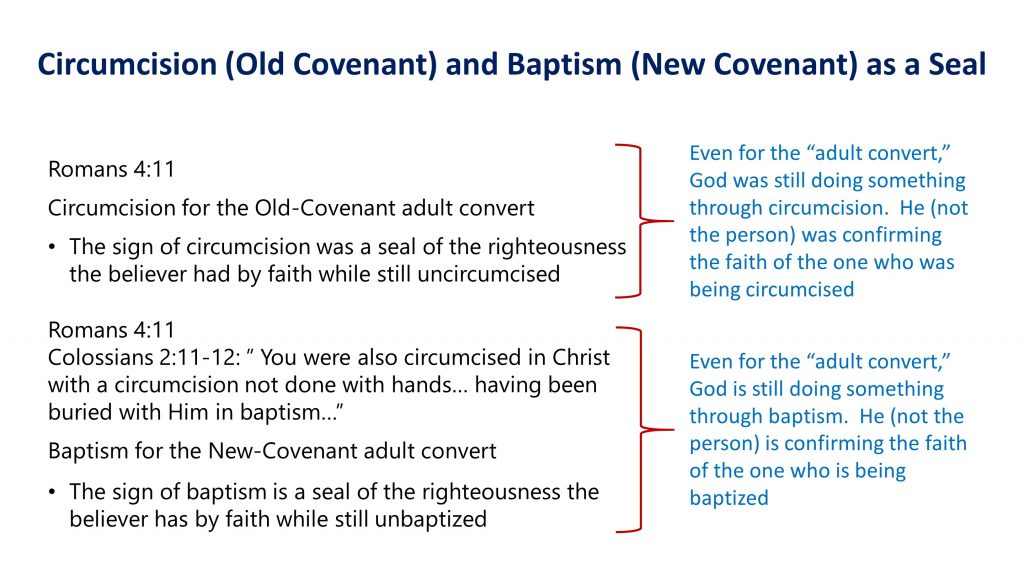 Earlier in Romans chapter 3, Paul transitioned from using “Law” to mean “Torah” (when he was addressing the Jewish Christian in the congregation) now to mean “God’s standard of righteousness for everyone” (Romans 3:19). Paul’s point? No one, whether Jew or Gentile, is righteous before God by what he does because no one can meet God’s standards of righteousness.
Earlier in Romans chapter 3, Paul transitioned from using “Law” to mean “Torah” (when he was addressing the Jewish Christian in the congregation) now to mean “God’s standard of righteousness for everyone” (Romans 3:19). Paul’s point? No one, whether Jew or Gentile, is righteous before God by what he does because no one can meet God’s standards of righteousness.
The solution? God is righteous and Jesus is faithful. Because of that, we believe.
God shows that at the present time He is righteous and the “righteouser” of those who have Jesus’ faithfulness (Romans 3:26). Because God is righteous and He does everything needed to save us in Christ Jesus, can we claim we contributed to our salvation? Paul now answers.
The Law of Faith
Read Romans 3:26-28
- What does the “law of faith” do with the “law of works”?
- Because the “law of works” is silenced, what does that do with being able to claim any credit for your salvation by what you do?
In Romans 3:29, we now realize Paul has again focused his attention on the Jewish Christians. This lets us know that his use of “law” has now transitioned back to meaning “Torah” and their misunderstanding and use of it. Someone is not righteous before God because of Old-Covenant circumcision.
Read Romans 3:29-31
- In vs. 31, Paul reveals that Christians “uphold the law”? If the Jewish Christians think they are already upholding the Law, what is the purpose of Paul’s statement?
Being Righteous by Faith, not Works: It’s always been that Way
Paul now starts with “What then?” transitioning from what he just said to a proof from Israel’s history: Abraham. Paul also provides a connection to what he just said by using the same words in Romans 4 to develop his thoughts further.
| Word | Romans 3 | Romans 4 |
| boast | 3:27 | 4:2 |
| work | 3:27-27 | 4:2, 4-6 |
| Law | 3:27-28, 31 | 4:13-16 |
| righteous (as a verb) and righteousness | 3:28, 30 | 4:2-3, 5-6, 9, 11, 13, 22 |
| faith / faithfulness | 3:27-28, 30 | 4:3, 5, 9, 11-14, 16 |
Background for Abraham: In Genesis 15, Abraham complains to God about being childless, without an heir (vs. 3-4). God promises to Abraham: You will have a son and heir—and become a nation as numerous as the stars of heaven (vs. 4-5). Abraham responds, trusting in God’s promise to him (vs. 6a): “And it was credited to him as righteousness” (v 6b, LXX).
Read Romans 4:1-3
- Why may Abraham not boast before God?
“believed”: active verb. Because Abraham “believed,” some can understand the grammar to mean that Abraham believing is a work, which God then credited to him as righteousness. This understanding would mean, “Because Abraham believed, God credited it [Abraham’s belief] as righteousness.” Paul then corrects such a possible understanding next.
Read Romans 4:4-5
- If faith, belief, in God is someone’s work, what then would be the result?
- If faith in God is not a work, what is the result?
Since belief is not a work, faith is “credited” to someone—not as something owed him—but as “righteousness.” A worker’s wages are credited as something owed; a believer’s faith is credited as righteousness.
Read Romans 4:6-8
“counts”: Greek, logizomai; “word” as a verb. The wordplay is that Jesus is the “word” and, thus, one has God’s righteousness because of Him. Logizomai means counts, accounts, or credits. Paul has a direct connection in these verses because both Genesis 15:6 and Psalm 32:2 use logizomai (LXX; chashab in the MT) in relation to having righteousness with God. Thus the Law (Torah, in Genesis) and the Prophets (in Psalms) attest to one’s righteousness as something God credits to the person, which He expresses, “words” it to be, not what we perceive from our human perspective.
- Running with what the Psalms say, what is the person’s state of being for whom God credits his righteousness?
Read Romans 4:9-10
This section begins with another “what then?” showing that Paul is going to develop this idea further.
- Is this stated of blessedness that God gives only for the circumcised (the Jews)?
If God’s blessing of salvation is only for the Jews, then why was Abraham “blessed” before he was circumcised?
Read Romans 4:11-12
- For Abraham, as an “adult convert,” what was circumcision?
- Remembering baptism as the fulfillment of circumcision (Colossians 2:11-15), how does our baptismal practice affirm what Paul teaches here?
“sign… seal”: In Genesis 17:11, circumcision was “the sign of the covenant.” Here, Paul changes perspective, focusing on what being in the covenant meant: trust in God and the righteousness He give you. Paul speaks of “the sign of circumcision,” which he says is the “seal” (Greek, sphragida, that which confirms, attests, or authenticates) the righteousness God credited to Abraham when he was still uncircumcised. Circumcision was the confirmation of something Abraham already had (faith) when he was still uncircumcised.
- If someone is baptized as an adult convert, does God still do anything through baptism?
- How does Abraham being uncircumcised and having faith attest to the Gentiles having faith apart from circumcision?
- What then is to keep the Jewish Christian from insisting on circumcision for the Gentile Christian after having faith, like Abraham?
- What is the connection between circumcision and living out the faith to which circumcision attested? (vs. 12)
- Discuss the same implications for baptism in the New Covenant.
Not by Doing but by Faith
Read Romans 4:13-14
Sirach 44:21: God promised Abraham with an oath to bless the nations through his Offspring… giving them an inheritance from sea to sea, and from the river to the ends of the earth.
- In light of Abraham’s promised Offspring, what does “heir of the world” mean?
- How does someone end up an “heir of the world”?
- Does someone earn an inheritance?
- Discuss the absurdity of turning circumcision into a work that someone does for God.
- Discuss the absurdity of turning baptism into a work someone does for God.
- What does the Law bring? What then awaits those who turn circumcision/baptism into their work for God?
Click here to go to the next Lesson.




